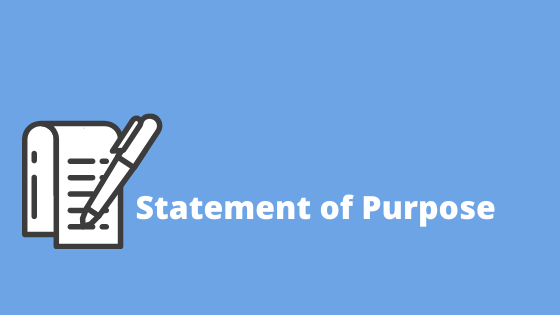Career Tips
Detailed Guide For Writing A Unique Statement Of Purpose (SOP)

A Statement of Purpose (SOP) is a 500-1500-word essay that gives the desired university a brief idea of the student’s academic and professional career trajectory, motivation for pursuing that stream, future goals after graduating, etc. A well-written statement of purpose can help them get their dream graduate degree. To conclude, it is the only way to inform universities about what makes you different.
The assessment committee must see an attractive SOP to grasp your commitment to the program . This step-by-step tutorial gives you everything you need to write a statement of purpose that will help you get into your dream university and pass the assessment process.
A Statement of Purpose (SOP), also known as a research statement or letter of intent, describes a student’s career path, interests, professional accomplishments and contributions, ambitions, and motivation for pursuing a program to the admissions panel. This is normally an essay, but some colleges may ask questions. It is the most important aspect of students’ applications that determines their admission to their selected school.
SOP is an essential study abroad application. Write a formal statement on your relevant experience, education, and motivations for studying abroad.
Use this link to check out numerous templates of statement of purpose for different applications
How to Write Statement of Purpose (SOP)?
- Plan it well
Make a plan for your SOP and work according to it. A smart method to start your introduction is to share an anecdote that inspired your interest in the desired subject. Make a list of your relevant accomplishments and expertise, as well as your motivation for enrolling in the course and attending the institution.
- Self-Reflect
Students should begin by thinking on their lives and remembering all of the major experiences that have influenced their thoughts, personalities, and behaviors. They must commit much time to introspection. For hopefuls with no work experience, there is very little beyond the academic world.
The best areas to talk about are motivations, aspirations, interests, vision, values, mottos, professional objectives, hobbies, strengths, weaknesses, and even failures.
- Drafting SOP and Highlight the Purpose
Focus on communicating what you’ve learned through your education and work experience. Don’t use technical words and write in an active voice when creating your SOP. If you have a gap year or an academic challenge, approach it with optimism. Make sure your SOP has a clear beginning and end. Prepare a proper structure and then fill in the details. Here are a few points to consider:
- Professional and personal background and interests,
- Relevance of the chosen course and University,
- A logical connection between the above and your future goals and aspirations,
- Intention to contribute to the University, community, and society at large.
When a student applies to a university, they hope to further their academically in a particular field. Then there’s the fact that it’s more than simply a foreign degree; there’s also a larger goal in mind: finding a job. Students must clearly and concisely convey their expectations of their selected program and university.
Students must conduct research on the university, the department, the curriculum, the professors, the university’s culture, and current and alumni students.
- Demonstrate your potential
The potential of a student is their ability to succeed at something. Students should describe the significance of their current activities and accomplishments, as well as summarize their careers. Students must demonstrate their ability to pursue and successfully complete the planned program. They must discuss their achievements in academics and extracurricular activities. The SOP must show that the student is adequately prepared for the program.
- Keep it Formal but Conversational
Students must write unique statements of purpose. Students should draft SOPs that captivate the admission committee and make them want to read more. Instead of providing information, their SOP should sound like a discussion. Explain how you overcame challenges. Give the Statement of Purpose accurate, concise, and honest information.
To write a decent SOP, pupils must understand the tone of language required. Being too nice or informal can hurt their application. Students’ SOPs should be formal but conversational. They should also be precise when describing their technical fields, work experience, and academic records.
- Portray as an asset to the university
Every university looks forward to accepting individuals who have the capacity to make the most of their studies and make meaningful contributions to the industry, research, or both. Let the university know how useful you are by emphasizing your eagerness to learn, your ability to swiftly adjust to changing situations, and your positive attitude toward taking on new challenges, among other attributes that make you a good fit for their student body.
- Customize Your SOP
The most common mistake students make is having a shared draft to which they make minor changes and submit while applying to multiple universities. What people don’t understand is that by trying to generalize it, it loses its meaning. Their cultures, techniques, visions, values, motto, strengths, and weaknesses that differ from university to university should all be included.
- Take help from Counsellors and Professors
Students should not be afraid to seek help from counsellors or experienced professors; they are technically competent and can provide them with significant suggestions on how to present their technical skills and project work in the statement.
- Review before sending
It is vital to go over what you have written. Rereading helps in the correction of flow, vocabulary, sentence construction errors, long sentences, and other grammar faults. See if you can get a second opinion from a senior, lecturer, or counselor. Make sure to proofread and double-check your work before submitting it.
Make an effort to write in an organized manner that covers all of the issues. Following a strict order will make your statement of purpose simpler to read and understand about you and your story.
Things to Avoid When Writing a Statement of Purpose for Scholarship:
- Errors, misspellings, poor English.
- Submit a handwritten essay (unless requested).
- “Talk down” to your audience. Your audience does not need to have basic terminology defined for them. Be mindful that they are already experts in the program that you are applying for.
- Be too personal in your essay. Do not focus on deep personal problems or excuses for past performances or experiences.
- Be repetitive or too general in your statements.
- Criticize other school programs.
- Use uncommon words that look like they came from a thesaurus.
- Write an autobiography. You want to give the committee a sense of who you are but they do not want to hear about your entire life story. Be specific and mindful of your personal details.
- Submit untruthful or irrelevant information in your essay.
- You do not want to copy and submit another student’s letter of intent.
- Being overly informal.
Strategy to Write a Powerful and Convincing SOP (Statement of Purpose)
A strong statement of purpose is emphasized throughout, and logic and reason connect each point. Logically connect your academic, professional, and career goals. Events must flow and not appear randomly.
The essay should begin with historical events, then go to present and future activities. When writing your SOP, divide it into paragraphs that cover all the points. How to write the SOP:
1st Paragraph: Introduction of SOP
This paragraph is often confused with self-introduction. It should not introduce you but should discuss what you are about to discuss in your SOP. You can adopt the following approaches:
- Discuss your long-term goal and connect it with your idea of pursuing the course you are applying to,
- Present your understanding of the chosen field and write how you want to contribute to that field,
- Explain your background in 2-3 lines and connect it with your future goals,
- Write about an anecdote that helped you realise your professional interest in the chosen field.
- Students often make the mistake of introducing themselves or their childhood in the first paragraph. In some cases, students tend to forget about the purpose behind writing an SOP. Check out the Common Mistakes to Avoid in an SOP.
2nd and 3rd Paragraphs: Academic Background and Professional Experience
These paragraphs must contain your academic background: what you have done so far (projects, experience, etc.), what you are currently pursuing, etc. You can mention your professional experience after your academic achievements. This helps in establishing your career progression.
4th Paragraph: Why This Course?
In this paragraph, you should discuss why you want to join a course and what modules would you like to study. It should also cover the possible skills and exposure that you might acquire that would help you in fulfilling your goals.
5th Paragraph: Career Goals
Discuss your short- and long-term goals in this most important paragraph. You should immediately decide where you wish to work after the course. Name some firms/companies within your home country and the position you desire to hold. This should describe your job profile.
Your long-term goal should be where you envision yourself in 10-12 or 15 years. This may include wanting to be a CEO/CFO/CTO or entrepreneur. Your desire of establishing your family business internationally may also be included. You may also be interested in PhD studies. You can also desire to teach or be a researcher.
Discuss your goals, principles, and influence on prospective students. You should demonstrate how you want to change the industry or society, taking into account existing and future trends.
6th Paragraph: Why This University?
Here, you should try to convince the University as to why it is suitable for your goals and why you fit well into its vision and mission. You can discuss the course curriculum, research work, faculty names, as well as university-specific activities. Moreover, do go through the vision and mission statement of the University.
7th Paragraph: Conclusion
This paragraph should conclude your desire and readiness towards joining the chosen course. Since this is the closing paragraph, you should sound focused and prepared for all the challenges that might come your way. It should also show that you have the potential to succeed, and with the help of the chosen course and University, you will definitely make a difference in the industry.




















